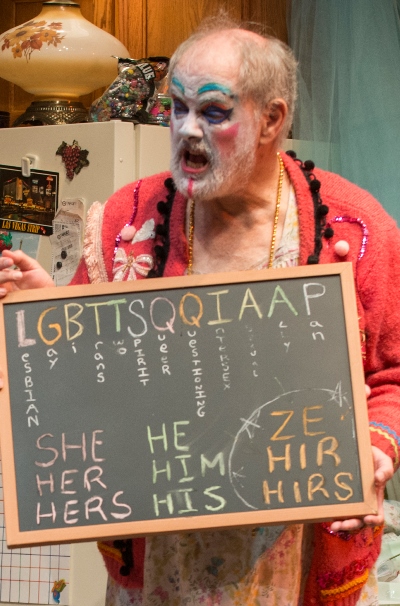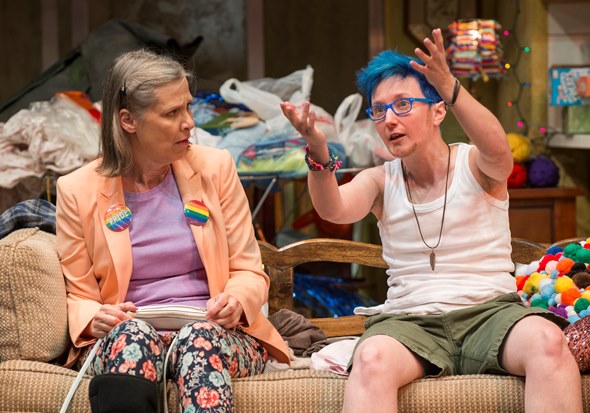‘Hir’ at Steppenwolf: In battle on home front, now a gender mine field, a Marine seeks cover
“Hir” by Taylor Mac, at Steppenwolf Theatre through Aug. 20. ★★★★
By Lawrence B. Johnson
Taylor Mac’s tumultuous, off-the-wall play “Hir,” currently on stage in a bristling production at Steppenwolf, is about battles, foreign and domestic. And if the shape-changing military one in the Middle East has been going on for a long time, the societal one at the center of “Hir” is just building a good head of steam.
 Time was when some distant antecedent of “Hir” might have been called a battle of the sexes. Ha! That was back when the sexes were defined by opposites like he and she, him and her, his and hers. And that’s how it was when Isaac went off to the Marines and a tour of duty in some hot spot or other. What he comes back to is a new sexual order, a whole new declension of genders in which “he” and “she” are but instances on a daunting new landscape.
Time was when some distant antecedent of “Hir” might have been called a battle of the sexes. Ha! That was back when the sexes were defined by opposites like he and she, him and her, his and hers. And that’s how it was when Isaac went off to the Marines and a tour of duty in some hot spot or other. What he comes back to is a new sexual order, a whole new declension of genders in which “he” and “she” are but instances on a daunting new landscape.
But that’s barely the half of it for poor, astonished Isaac. Fresh from one war zone, he walks into the home in which he grew up to find – what is the word? – chaos, catastrophe: a household turned upside down, its contents strewn over the floor, his father wearing make-up and a dress, his mother ruling a roost once ruthlessly dominated by dear old Dad. And his now-adolescent sister become, or in the process of becoming, a male. But not exactly a he, a him.
Amid the domestic calamity, which Mom (Amy Morton) now cultivates with the pride of a fastidious gardener, Isaac has scarcely put down his duffle bag when Paige – that’s his mother – directs him to a chalk board displaying the new lexicon of gender identification. It is not something to be mastered at first glance. What Isaac, had he been paying attention back in the day, might have recalled as LGBQT has transmogrified into – wait for it – LGBTTSQQIAAP, for which Paige has actually come up with a pronunciation: Lugabuttsqueehah.
 Isaac’s reaction is roughly, “Say what?” He’s trying to absorb this new high-density information while stepping around piles of detritus in what once was an orderly household. And he’s positively reeling from the sight of his father (Francis Guinan, gamely absurd and silently raging) slathered in makeup, wearing a farcical wig, in a dress, saying nothing. When in walks Max, the sister, whose welcome home to big brother is followed closely by the update that she has grown a penis. Well, OK, not a penis, as Paige corrects her. An enlarged clitoris. The result of the ’mones – hormones to you – she’s been ingesting.
Isaac’s reaction is roughly, “Say what?” He’s trying to absorb this new high-density information while stepping around piles of detritus in what once was an orderly household. And he’s positively reeling from the sight of his father (Francis Guinan, gamely absurd and silently raging) slathered in makeup, wearing a farcical wig, in a dress, saying nothing. When in walks Max, the sister, whose welcome home to big brother is followed closely by the update that she has grown a penis. Well, OK, not a penis, as Paige corrects her. An enlarged clitoris. The result of the ’mones – hormones to you – she’s been ingesting.
Isaac shrinks from this freely shared vocabulary and all it implies as if cringing under heavy mortar fire.
Then he unknowingly impugns his sister’s newfound, or anyway evolving, sexuality by referring to Max (Em Grosland) with words like he, or is it she; him, or is it her? None of the above, rejoins Max. Hereafter, in the nominative, Max is no longer he or she but ze; in the objective, not him or her but hir (and please pronounce it here); in the genitive, not his or hers but hirs (rhyming with ears). Got it? Good.
But Isaac doesn’t have it at all. Isaac (the sympathetically perplexed and doggedly normalizing Ty Olwin) is stupefied. What’s with this disaster of a house? Why is Dad wearing a dress?
 Paige, in Morton’s authoritative and dispassionate and unequivocal accounting, brings Isaac up to speed. That damnable man, her husband, that self-centered tyrant who freely beat his wife and children and treated them all like his slaves, suffered a debilitating stroke. Now behold this nearly mute simpleton, this man in diapers who soils himself. The tables are turned: He is at his wife’s mercy, and she has none to offer. She keeps the house brutally cold, squirts him with water when he gets out of line. Makes him wear a dress.
Paige, in Morton’s authoritative and dispassionate and unequivocal accounting, brings Isaac up to speed. That damnable man, her husband, that self-centered tyrant who freely beat his wife and children and treated them all like his slaves, suffered a debilitating stroke. Now behold this nearly mute simpleton, this man in diapers who soils himself. The tables are turned: He is at his wife’s mercy, and she has none to offer. She keeps the house brutally cold, squirts him with water when he gets out of line. Makes him wear a dress.
That’s the darkly funny stuff, which is already becoming darker than funny when Paige and Max go out for the afternoon and the newly arrived Marine does what any Marine might do: He restores order, washes his dad’s face, replaces the dress with a shirt. Then Paige comes home, and comedy flies out the window. Wills are tested, blows threatened, blows landed. Max confronts an issue larger than sexual orientation. By whatever gender label, by whatever pronoun, Grosland’s earnest and appealing Max – ultimately a kid trying to find meaning and a place in the world like any kid – shows the unsexed virtue of human kindness.
On her bizarre terms, Morton’s hardened Paige, this hammered drill sergeant of the home base, prevails. One can only wonder what she has won. Perhaps the freedom to choose is sufficient. And she has granted Max no less a privilege.
For all its visual shock – Collette Pollard’s dump site of a set is pretty daunting and Jenny Mannis’ loony getup for Dad says it all – this is an articulate, elegantly wrought play. Beneath all the craziness that edges into surrealist and absurdist theater, the narrative is clear-sighted and searing. Knowingly directed by Hallie Gordon, “Hir” is a provocative pleasure.
Related Link:
- Performance location, dates and times: Details at TheatreinChicago.com
Tags: Amy Morton, Collette Pollard, Em Grosland, Francis Guinan, Hallie Gordon, Jenny Mannis, Steppenwolf Theatre, Taylor Mac, Ty Olwin


